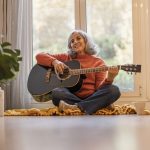Scientists uncover a surprising shield against Alzheimer’s – and it’s not a drug
 (NaturalHealth365) Forget overpriced, low quality supplements. Scientists have uncovered a secret weapon against memory loss and dementia: playing a musical instrument. Two brand-new studies published in PLOS Biology and Imaging Neuroscience reveal a stunning truth: music doesn’t just soothe the soul – it literally protects and rebuilds the aging brain.
(NaturalHealth365) Forget overpriced, low quality supplements. Scientists have uncovered a secret weapon against memory loss and dementia: playing a musical instrument. Two brand-new studies published in PLOS Biology and Imaging Neuroscience reveal a stunning truth: music doesn’t just soothe the soul – it literally protects and rebuilds the aging brain.
Researchers found that older adults who actively engage in playing instruments show stronger memory, sharper attention, and more resilient brain networks than their non-musical peers. Even more striking, the brain changes weren’t just temporary. Imaging scans revealed that regular practice helps rewire neural circuits, strengthening connections that typically weaken with age.
In other words, picking up an instrument may be one of the most powerful (and overlooked) forms of brain training – offering natural protection against Alzheimer’s and other forms of dementia without a prescription.
The “youthful brain” effect of lifelong musicians
Canadian and Chinese researchers scanned the brains of adults in their 60s and compared the brains of lifelong musicians to those of non-musicians. The results? The brains of older musicians appeared and functioned more like those of people 40 years younger.
When asked to identify speech in noisy environments (a daily struggle for older adults), lifelong musicians’ brains lit up with youth-like patterns of connectivity. Instead of straining and over-activating brain regions (the neural equivalent of shouting to be heard), their brains stayed calm, efficient, and razor-sharp.
“Just like a finely tuned violin doesn’t need to be played louder, the brains of older musicians stay finely tuned thanks to years of practice,” explained study co-author Dr. Yi Du.
Translation: Music training builds cognitive reserve – a shield of resilience that delays or even prevents age-related decline.
It’s never too late to start
But here’s where things get truly shocking. A team in Japan followed 53 seniors who learned an instrument for just four months. At first, no significant changes were apparent. But four years later, when researchers scanned them again, the story had flipped.
-
Those who quit playing? Their memory performance dropped, and their putamen (a critical memory and motor region) had visibly shrunk.
-
Those who kept playing? Their brains resisted shrinkage, and their memory held strong – even into their late 70s and early 80s.
In other words, it’s never too late to start protecting your brain. Even picking up an instrument for the first time in your 70s can slow memory decline and preserve brain structure.
Practical ways to harness music’s brain benefits
The exciting part about this research is that you don’t have to become a concert pianist to reap the benefits. What matters is engaging the brain in challenging, full-body ways. Here are simple, natural strategies you can start today:
-
Learn an instrument at any age. Even 10 minutes a day on piano, guitar, or drums engages motor skills, memory, and emotion.
-
Sing or join a choir. Singing stimulates breath control, rhythm, memory, and community – powerful brain protectors.
-
Dance to music. Moving with rhythm combines exercise and coordination with the cognitive stimulation of timing and recall.
-
Combine music with movement. Practices like drumming while walking or dancing while singing activate multiple areas of the brain simultaneously.
-
Feed your brain. Support neuroplasticity with brain-loving nutrients like omega-3s (from wild salmon or organic flaxseeds), antioxidants (from organic berries and greens), and healthy fats (like organic coconut oil).
-
Prioritize sleep and stress relief. Memory consolidation and detoxification happen during deep sleep. Stress management through meditation further protects the brain.
Playing music is only one way to preserve cognitive function
These studies prove the brain is far more adaptable than most people realize, but music is just one piece of the larger brain-protection puzzle. True cognitive resilience requires a multi-faceted approach: nutrition, detoxification, stress relief, emotional healing, and lifestyle upgrades that work together to preserve memory and sharpen focus.
That’s precisely why Jonathan Landsman created the Alzheimer’s and Dementia Summit – bringing together 31 of the very best scientists, doctors, researchers, and nutrition experts. Their collective strategies provide a comprehensive roadmap to protect your brain, combat memory loss, and even restore function.
This is your chance to discover what top experts are doing to prevent and reverse memory loss – strategies you won’t hear anywhere else.
Don’t wait until symptoms appear. Protect your brain now because your future self is counting on it.
Sources for this article include:



